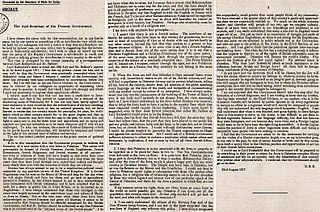The Third Way is a political position advocating a varying synthesis of center-right and center-left policies.
Contents
Third Way may also refer to:
The Third Way is a political position advocating a varying synthesis of center-right and center-left policies.
Third Way may also refer to:
Neo-fascism is a post–World War II far-right ideology that includes significant elements of fascism. Neo-fascism usually includes ultranationalism, racial supremacy, populism, authoritarianism, nativism, xenophobia, and anti-immigration sentiment, as well as opposition to liberal democracy, social democracy, parliamentarianism, liberalism, Marxism, capitalism, communism, and socialism. As with classical fascism, it proposes a Third Position as an alternative to market capitalism.

Far-right politics, or right-wing extremism, is a spectrum of political thought that tends to be radically conservative, ultra-nationalist, and authoritarian, often also including nativist tendencies. The name derives from the left–right political spectrum, with the "far right" considered further from center than the standard political right.
Radical centrism, also called the radical center, the radical centre, and the radical middle, is a concept that arose in Western nations in the late 20th century. The radical in the term refers to a willingness on the part of most radical centrists to call for fundamental reform of institutions. The centrism refers to a belief that genuine solutions require realism and pragmatism, not just idealism and emotion.
The National Religious Party was a political party in Israel representing the religious Zionist movement.

The Homeland, previously known as the National Democratic Party of Germany, is a far-right Neo-Nazi and ultranationalist political party in Germany.
Patrick Antony Harrington is a far-right British political activist and writer of Irish Catholic family origins, who has published pamphlets by the Social Credit advocate and former editor of the Liverpool Newsletter, Anthony Cooney, about prominent Catholic writers such as G.K. Chesterton, J.R.R. Tolkien and Hilaire Belloc. He is currently general secretary of Solidarity – The Union for British Workers and a director of the Third Way, a think tank.
New antisemitism is the concept that a new form of antisemitism which developed in the late 20th and early 21st centuries, tends to manifest itself as anti-Zionism. The concept is included in some definitions of antisemitism, such as the working definition of antisemitism and the 3D test of antisemitism. The concept dates to the early 1970s, although the identification of anti-Zionism with antisemitism has "long been de rigueur in Jewish communal and broader pro-Israel circles".
The Third Position is a set of neo-fascist political ideologies that were first described in Western Europe following the Second World War. Developed in the context of the Cold War, it developed its name through the claim that it represented a third position between the capitalism of the Western Bloc and the communism of the Eastern Bloc.
The Washington Institute for Near East Policy is a pro-Israel American think tank based in Washington, D.C., focused on the foreign policy of the United States in the Near East.

Kadima was a centrist and liberal political party in Israel. It was established on 24 November 2005 by moderates from Likud largely following the implementation of Ariel Sharon's unilateral disengagement plan in August 2005, and was soon joined by like-minded Labor politicians.

Germany–Israel relations are the diplomatic relationship between the Federal Republic of Germany and the State of Israel. After the end of World War II and the Holocaust, relations gradually thawed as West Germany offered to pay reparations to Israel in 1952 and diplomatic relations were officially established in 1965. Nonetheless, a deep mistrust of the German people remained widespread in Israel and the Jewish diaspora communities worldwide for many years after. Relations between East Germany and Israel never materialised. Israel and Germany now maintain a "special relationship" based on shared beliefs, Western values, and a combination of historical perspectives. Among the most important factors in their relations is Nazi Germany's genocide of Jews in Europe during the Holocaust.
Neo-Zionism is a right-wing, nationalistic and religious ideology that appeared in Israel following the Six-Day War in 1967 and the capture of the West Bank and Gaza Strip. Neo-Zionists consider these lands part of Israel and advocate their settlement by Israeli Jews. Some advocate the transfer of Arabs not only from these areas but also from within the Green Line.
Politics is the process by which groups of people make decisions. Although the term is generally applied to behavior within civil governments, politics is observed in all human group interactions, including corporate, academic, and religious institutions. Politics consists of "social relations involving authority or power. The definition of "politics" from "The Free Dictionary" is the study of political behavior and examines the acquisition and application of power. Politics study include political philosophy, which seeks a rationale for politics and an ethic of public behavior, and public administration, which examines the practices of governance.

In popular discourse, the horseshoe theory asserts that the far-left and the far-right, rather than being at opposite and opposing ends of a linear continuum of the political spectrum, closely resemble each other, analogous to the way that the opposite ends of a horseshoe are close together. The theory is attributed to the French philosopher and writer of fiction and poetry Jean-Pierre Faye in his 2002 book Le Siècle des idéologies.

Anti-Zionism is opposition to Zionism. Although anti-Zionism is a heterogeneous phenomenon, all its proponents agree that the creation of the modern State of Israel, and the movement to create a sovereign Jewish state in the region of Palestine—a region partly coinciding with the biblical Land of Israel—was flawed or unjust in some way.

Criticism of Israel is a subject of journalistic and scholarly commentary and research within the scope of international relations theory, expressed in terms of political science. Israel has faced international criticism since its declaration of independence in 1948 relating to a variety of issues, many of which are centered around human rights violations in its occupation of the West Bank and the Gaza Strip.
Centrism is a political outlook or position involving acceptance or support of a balance of social equality and a degree of social hierarchy while opposing political changes that would result in a significant shift of society strongly to the left or the right.
Politics in Israel are dominated by Zionist parties. They traditionally fall into three camps, the first two being the largest: Labor Zionism, revisionist Zionism, and religious Zionism. There are also several non-Zionist Orthodox religious parties and non-Zionist secular left-wing groups, as well as non-Zionist and anti-Zionist Israeli Arab parties.